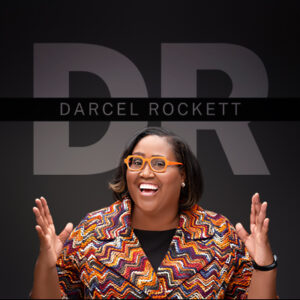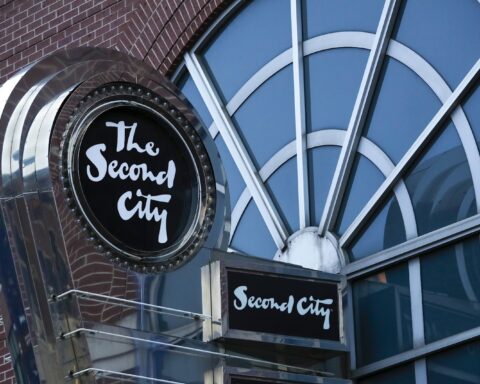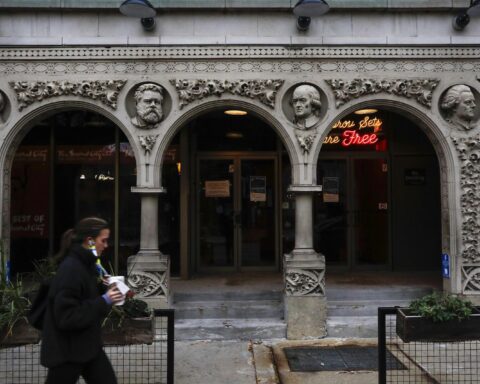The company’s ownership and leadership teams are in flux after allegations of institutional racism went viral on social media. The remaining decision makers vowed to review everything from human resources protocol to material used in shows and artwork on their walls — even as the coronavirus pandemic has reduced resources and theater alumni question if these steps will bring actual change.
“It’s just hard to trust when it feels like we’ve kind of gone through this multiple times. Like we’ve had this diversity conversation over and over again, and it’s all very reactionary,” said Tina Arfaee, a 2016 Bob Curry fellow. “I guess maybe this is hard to do. I don’t want to like totally (expletive) on them. Sorry for the language, but I feel like if there was an actual care to make this a priority, it would have happened already. Instead of doing it out of like, Hey, a lot of people are mad at us.”
Committing to diversity is not new for Second City, which has a history of starting efforts to address the issue, including some that are ongoing and others that long ago fell by the wayside. Second City said its goal is to create and sustain an environment where artists and staff feel supported in their careers and can thrive.
The Chicago Tribune talked to two dozen Second City alumni of color about their experiences at the Chicago headquarters and interviewed three of the company’s current leaders in an hourlong Zoom session about why they think they will succeed at providing safe and equitable performance spaces going forward. It is work they promise to do amid the continuing search for a new owner or owners who could have their own vision for the company; as the pandemic inflicts financial stress; and despite the lack of a clear model for such a rebuild on the diversity front in the theater world.
“That’s the whole thing. We have to be the ones that figure this out, because in theory, we’re the place that people look to,” interim Second City executive producer Anthony LeBlanc told the Tribune during an Oct. 1 interview.
Theaters around the country have been going through their own racial reckoning, but eyes are focused on Second City because of its national reach and storied history.
Named for a jab about Chicago by a New Yorker journalist, Second City was founded by University of Chicago alumni Bernie Sahlins, Paul Sills, and Howard Alk in 1959. An Old Town laundromat was transformed into a 150-seat cabaret that grew into an empire frequently funneling talent to “Saturday Night Live” and other late-night comedy shows. John Belushi, Steve Carell, Stephen Colbert, Chris Farley, Tina Fey and Tim Meadows are among those who honed their performing chops at the Chicago theater at 1616 N. Wells St. Second City eventually expanded into Toronto and Hollywood, among other locations, and the company now includes training centers, a touring business, corporate education and entertainment division and comedy film school.
Like other sketch comedy and improv troupes, Second City’s initial casts were composed mostly of white men. Paul Sand, who is of Mexican descent, and Chinese-American actor Victor Wong joined early on. But it wasn’t until 1966 that Bob Curry became the first Black cast member in Second City’s resident company. By 2003, only 11 Black people had joined resident companies, the Chicago Reporter noted at the time.
It was also difficult to find a scene with women in it before the 1995 revue “Piñata Full of Bees,” let alone a scene with a woman of color. Rose Abdoo, of Dominican and Lebanese descent, said she was hired for the touring company in 1988, while Suzy Nakamura joined Second City in the early 1990s. They couldn’t recall fellow female performers who looked like them.
“As soon as that New York Times article came out, my first thought was that I had failed,” Nakamura, who stars on the HBO series “Avenue 5,” told the Tribune as she referenced a New York Times article from August that highlighted stories from Second City alumni who said they were demeaned, marginalized and tokenized. “I mean, this is going to sound extreme, but I did feel like I failed every person of color that came after me. I think we were so focused on being women and advocating as women that we completely forgot people of color.”
There have been pushes to increase diversity over the years. Outgoing co-owner Andrew Alexander has said publicly the 1992 Los Angeles race riots were a wake-up call that led to the start of Second City’s outreach program, which included summer workshops and new sketch groups. The company hired a full-time director of diversity and inclusion in 2002 and began hosting Black History Month shows.
2014 saw the first class of the Bob Curry Fellowship program, which provides tuition-free Second City training for 10 weeks for Black, Indigenous and people of color (BIPOC) and others. The company says since the fellowship’s launch, more than 50% of graduating fellows have been hired into various Second City divisions, including the touring business, resident stage ensembles, theatricals and cruise ship companies and as training center teachers, though some performers said there didn’t seem to be a clear path for them once the program ended.
“Honestly, Bob Curry was the height of it all for me, and that’s kind of a bittersweet thing because it was such a good feeling to get up that high only for it to not really go anywhere,” said Miguel Lepe Jr., a 2015 Bob Curry fellow.
Applications are being accepted for a new Second City and “SNL” scholarship program that’s said to give recipients with “diverse life experiences” Second City training and connect them with “SNL” talent executives. Other initiatives have come and gone, including turn-of-the-century plans for a $2.8 million theater and training complex in the Bronzeville neighborhood on the South Side; a foundation with a stated mission that included identifying and developing minority artists; scholarships for free improv training and an outreach and diversity Twitter account that has not been active since March.
Parisa Jalili, who was promoted to Second City chief operating officer in July, said an operational infrastructure wasn’t in place to support those ventures, and that’s why they failed.
“We have learned from why that hasn’t worked. That’s why this time is different in that space. We are putting the ecosystem and the infrastructure and the operations around these initiatives,” Jalili told the Tribune. She previously was the vice president of sales operations.
Jalili’s promotion was part of a leadership team overhaul that took place this summer following the killing of George Floyd. Second City posted a Black Lives Matter tweet that spurred Black actor Dewayne Perkins to call the company a “toxic predominantly white environment” where he was subjected to racial slurs. An open letter from Black Second City alumni and employees demanding investigation into abuse against Black artists soon followed.
Alexander, the Second City co-owner, resigned as executive producer in June. LeBlanc, who joined Second City as a performer in 2003, became the interim executive producer. Maya Bordeaux, a former Tribune Publishing Company senior vice president, was named interim chief HR officer. Christal Morris was appointed Second City’s interim chief diversity officer. Morris was not available for the Tribune interview. When asked how Second City defines “equity,” Bordeaux said an “official definition will happen” after discussion with company leaders and feedback from employees.
Second City leadership solicited input from performers and alumni in the summer before declaring its plan to fix operations and culture. Among the promises: Creation of a diversity, equity and inclusion (DEI) council focused on ensuring Second City is an “inclusive, welcoming environment able to attract and retain diverse talent and help them advance their careers”; a face-lift of Second City spaces with an eye toward highlighting the contributions of “those who may have been traditionally disregarded or forgotten”; and a review of archive scripts to flag and remove “outdated and/or problematic content” from use for classes or shows.
These efforts were announced during the coronavirus pandemic, which has greatly affected operations and surely, revenue. Chicago stages have been dark since March, and the Hollywood training center is closed. The Toronto location resumed in-person shows with limited audiences in September before announcing on Oct. 12 it was “pausing” performances because of new Toronto coronavirus rules.
“It is a phased approach that goes over a certain period of time, which also by default spreads the financial burden over time as well,” Jalili said about Second City’s DEI plans. “So we’re prioritizing what we’re doing, as needed, for how we’re operating right now and ensuring that we’re complying with our commitments that we’ve made for change as we ramp up the business as well.”
Second City, a private company, does not disclose its annual revenues, and it’s unclear how much COVID-19 has impacted its bottom line. (From 2010 to 2014, the Tribune partnered with Second City to produce a series of weekly events called “Chicago Live!” that featured Tribune journalists conducting interviews with local and national personalities and included Second City sketches. It was broadcast on WGN Radio.)
Before the pandemic, Second City had some 750 people on the payroll companywide, but two-thirds of the staff were cut in March, Alexander told the Tribune at the time. Second City declined to give recent workforce numbers.
Jalili told the Tribune the corporate education arm of the company, Second City Works, and the training centers are “actually doing well, and they’re thriving” as these ventures moved online. Since September, Second City also has hosted $15 livestream happy hours each Thursday that feature games, sketches and online audience participation. The happy hour cast and crew have undergone diversity training with the expectation they adhere to a behavioral code of conduct, per Second City.
Second City is not the only theater grappling with equity issues. Hundreds of performers, including Viola Davis, Lin-Manuel Miranda and Leslie Odom Jr. signed their names to a 29-page open letter addressed to “White American Theater” that called out systemic racism following Floyd’s May death.
Shanta Thake, associate artistic director and director of artistic programs at New York City’s Public Theater, said she doesn’t remember theatrical institutions being called out so publicly in this way before, but she was not surprised by the letter.
For its own part, the Public announced a set of DEI goals, including increasing diversity of its staff and board, to be achieved by 2023. The theater’s code of conduct also was recently revised to be more clear about race, Thake said. “We really have to do the work, and this is what doing the work looks like,” she said.
Here in Chicago, artistic director Anna D. Shapiro said Steppenwolf Theatre Company is focused on DEI initiatives, but “I always wish it could move faster, and I always wish it had started sooner.”
“We focused on the art, that’s great. But like (new executive director) Brooke (Flanagan) is always saying: ;Who are your vendors? Not just who are your staff, who are your vendors? Who are the contract workers that you have?’” Shapiro said.
LeBlanc hopes Second City sets the tone for other theaters on the DEI front. “We want to be that place where other theaters, other schools, all the other folks in the country can look to us,” LeBlanc said. “Second City is the flagship of the comedy theatrical institutions, so we know that’s a big responsibility that we have.”





